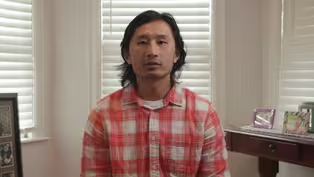
Slashing Science
Clip: Season 6 Episode 19 | 11m 1sVideo has Closed Captions
The Trump administration pulling millions of dollars in research funding from Rhode Island.
The Trump administration has slashed scientific research across the country, including cutting tens of millions of dollars’ worth of research in Rhode Island. Researchers fear it will set science back, and impact the new life sciences industry being created in the Ocean State.
Problems playing video? | Closed Captioning Feedback
Problems playing video? | Closed Captioning Feedback
Rhode Island PBS Weekly is a local public television program presented by Ocean State Media

Slashing Science
Clip: Season 6 Episode 19 | 11m 1sVideo has Closed Captions
The Trump administration has slashed scientific research across the country, including cutting tens of millions of dollars’ worth of research in Rhode Island. Researchers fear it will set science back, and impact the new life sciences industry being created in the Ocean State.
Problems playing video? | Closed Captioning Feedback
How to Watch Rhode Island PBS Weekly
Rhode Island PBS Weekly is available to stream on pbs.org and the free PBS App, available on iPhone, Apple TV, Android TV, Android smartphones, Amazon Fire TV, Amazon Fire Tablet, Roku, Samsung Smart TV, and Vizio.
Providing Support for PBS.org
Learn Moreabout PBS online sponsorship- You know, as a scientist, I feel that the field is under attack.
- [Steph] In 2019, researcher Dr. Amy Nunn was watching the State of the Union address and heard President Trump say this.
- My budget will ask Democrats and Republicans to make the needed commitment to eliminate the HIV epidemic in the United States within 10 years.
We have made incredible strides, incredible.
(audience clapping) - I was lying in bed and I heard him say that, and I almost fell out of the bed because I had never expected that President Trump would announce the first plan to end the epidemic.
- [Steph] Six years later, just months into Trump's second term, the Trump administration canceled Nunn's research aimed at reducing the spread of HIV.
- Well, I was alarmed and I was really surprised.
He's basically undoing a lot of the progress from his first administration, our trial responded to all of the priorities that he had laid out previously.
- [Steph] Nunn's research for the Rhode Island Public Health Institute, which runs a Providence clinic for LGBTQ patients called Open Door Health, was testing a new protocol to encourage the use of PrEP a medication that prevents someone from contracting HIV, focusing on black and Latino men.
- Black, gay men have about a one in two lifetime chance of contracting HIV.
That's higher than some HIV prevalence rates in Sub-Saharan Africa.
Just to put it in context.
For a white man, it's one in 140.
So people of color have much higher chances of contracting HIV.
And so this trial is really designed to reduce transmission among those populations.
- [Steph] Nunn's team received the $3.7 million grant through Brown University from the National Institutes of Health, NIH, and was in the middle of enrolling 300 patients in Rhode Island, Mississippi, and Washington DC.
The termination letter said the award no longer effectuates agency priorities and so-called diversity, equity and inclusion, DEI studies are often used to support unlawful discrimination on the basis of race and other protected characteristics which harms the health of Americans.
- This isn't just DEI, this is about saving the lives of people who are the sickest or who are the most likely to get sick.
And now we're eradicating our commitments to those vulnerable people and we have a moral issue with that.
- More than a thousand grants for scientific research and public health have been terminated by the Trump administration across the country, including more than 50 that have come in steadily to Brown University and the University of Rhode Island since February.
And it's not clear when the terminations might stop.
- I think the cuts, if we do nothing today, will set the field back decades.
- Dr. Philip Chan works with Nunn at Open Door Health and has had three research grants canceled.
- It is incredibly, incredibly rare for an NIH grant to be canceled.
You basically have to do something really wrong for that to happen.
To just uniformly cancel, you know, all these grants based on political ideology or because they're enrolling transgender people is really never happened before.
- [Steph] Many of the terminated grants have been for studies involving gender, race or LGBTQ issues.
- So here you can see down at Quonset there were a couple of impacts.
- [Steph] But not all.
At the University of Rhode Island, Dr. Austin Becker has spent years developing a tool that tracks the potential impact of a hurricane on critical infrastructure.
- And then you can see here's something down at the port, a few other things down at the port that have been impacted.
- [Steph] The Department of Homeland Security terminated the research on April 8th.
- I was pretty shocked by it.
You know, we hear a lot about DEI work getting terminated and climate change work getting terminated, but this work is really focused on today's challenges for all coastal communities in Rhode Island and beyond the borders of Rhode Island.
- Were you given a reason at all?
- The only reason we were given is that the work did not align with the priorities of the Trump administration.
His tool called Rhode Island Coastal Hazards Analysis, Modeling and Prediction or RI-CHAMP was being used in projects for the Rhode Island Emergency Management Agency, multiple cities, the Port of Providence and the US Coast Guard.
I'm struck by the fact that some of your work was meant to benefit the Coast Guard because that means it was for the federal government and yet the federal government cut your funding.
What do you make of that?
- Well, I don't think anybody looked at the individual projects.
- [Steph] The widespread cuts come at a pivotal time for scientific research in Rhode Island.
State leaders funneled $45 million last year into a new agency called the Rhode Island Life Sciences Hub, aimed at strengthening the state's life sciences sector, starting in Providence's jewelry district.
(machine beeping) On Richmond Street, the Hub's first big project is nearly complete, a new state health lab topped by incubator space called Ocean State Labs, where the state hopes to lure private tenants to do cutting edge research, resulting in medical innovations.
- It's a whole floor above that and then... - [Steph] Dr. Mark Turco is the Life Science Hub's first CEO.
He was confirmed to the job by the state senate one day after President Trump's inauguration.
- And clearly what's going on at the federal level right now is a headwind for the science, you know, field.
That said, we have made incredible progress and strides, you know, in the life science sector here in Rhode Island.
And, you know, our thought and my thought is that we can continue, you know, to continue with the momentum moving forward.
- [Steph] Despite the upheaval in the research community, Turco is optimistic the labs will be filled and that philanthropic and private sector money could fill in the gaps where federal funding is cut.
- I think this is a time where we need to think out-of-the-box a little bit.
You know, we can't control what is going on at the federal level.
So how can we basically look at our opportunities where we can differentiate ourselves and think of things a little bit differently.
- Do you think it has been a mistake that in general scientific research has relied on the federal government to come to fruition?
- I do think that there has been a reliance that is probably beyond what we should have had a reliance on.
And some of these cuts actually in my opinion, need to occur.
You know, we have spent a lot of money and, you know, we need to show a lot of return for investment on some of these dollars.
And, you know, I don't think that that's bad to be sure that we're, you know, positioned ourselves to show a return on investment, you know, coming out of our academic institutions.
(steel crashing) - Brown University is building its own massive 300,000 square foot lab space in the jewelry district, which will be the largest academic laboratory in the state when completed, aimed at housing 700 researchers.
But the university has said in court documents, "If the NIH is allowed to follow through with planned cuts to overhead, the university may have to halt construction."
Brown University President, Christina Paxson, declined to be interviewed for this story, citing the uncertainty around President Trump's threat to cut $510 million from the university.
A spokesperson says Brown has not been formally notified of this cut, but they're planning for every possible scenario.
The worst case could mean widespread cuts to research, significant layoffs and a ripple effect on the local economy.
- I think this is an attack on science and truth, and it's ultimately a way to control messaging.
And that is terrifying because the nation's top universities are under assault because of their commitment to finding the truth and finding answers.
And I think that we might be in the middle of a cultural revolution in which that's no longer valued.
- [Steph] NIH Director, Jay Bhattacharya sought to quell concerns about the cuts in late April during a five hour Zoom meeting with an NIH advisory council.
- I don't think that that they're aimed at stopping fundamental research that advances the health and wellbeing of minority populations.
I wouldn't have accepted this job if that was the case.
- [Steph] But scientists say restarting research isn't easy.
It can take years to apply for grants, secure funding, hire staff, enroll patients, and conduct the studies.
- I think it might take a generation to bounce back from this even if we see a renewed commitment later on.
- Losing funding for projects like this right in the middle of them, it's, you know, it's several steps backwards.
I hope we can find some other funding to continue the work in the future.
When we do, we will have a lot of lost ground just to get back to where we were three weeks ago.
Video has Closed Captions
Clip: S6 Ep19 | 8m 59s | Telepsychology offers new hope for local students amidst a growing mental health crisis. (8m 59s)
Video has Closed Captions
Clip: S6 Ep19 | 5m 38s | Isabella Jibilian’s story on a local Hmong family who talk about their history in Rhode Island. (5m 38s)
Providing Support for PBS.org
Learn Moreabout PBS online sponsorship
- News and Public Affairs

Top journalists deliver compelling original analysis of the hour's headlines.

- News and Public Affairs

FRONTLINE is investigative journalism that questions, explains and changes our world.












Support for PBS provided by:
Rhode Island PBS Weekly is a local public television program presented by Ocean State Media

